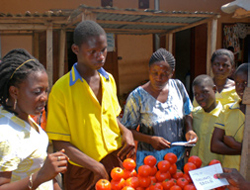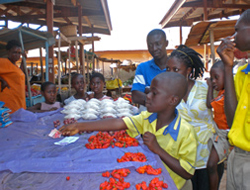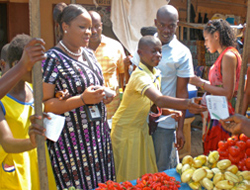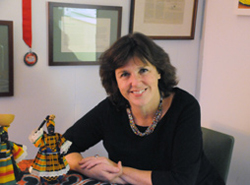Communicating with the Outside World
TC students earn credits and get hands-on clinical experience working with children in Ghana
TC students working with children in Ghana
By Elizabeth Dwoskin
Last year, when Cate Crowley and her TC speech pathology students traveled to Ghana, they asked parents of young people with communication disorders for a wish list of things they wanted their children to be able to do.
The most common answer: to be able to shop for food for the family in the local markets.
Though many were cognitively able, the children—who were suffering from communication disorders stemming from cleft palates, damaged vocal chords, apraxia, cerebral palsy and autism—lacked speech skills to make purchases in the market. There were cultural obstacles, as well. In Ghana, where people with disabilities are highly stigmatized, parents feel ashamed of their children and often hide them away, depriving them of education or an opportunity to learn to communicate with the outside world.
“It really brings into perspective how to work with people from different cultural communities,” says Alana Bibergal, a recent graduate of TC’s program, who is now completing her clinical fellowship year with the New York City Department of Education, working with public school children from diverse backgrounds in Brooklyn. “You think about what [parents] can do to help their child, while keeping in mind their values.”
Crowley, Director of TC’s Bilingual Extension Institute—part of the College’s Speech Language Pathology Program—dreamed up the Ghana trip after having success with a similar program that she created in La Paz, Bolivia. As in Bolivia, making the right local contacts proved essential. In Ghana, Crowley connected with Dr. Peter Donkor, the Provost of the teaching hospital in Kumasi and head of the cleft palate clinic there and Dr. Emmanual Kitcher chair of the ENT Department at the University of Ghana.
She also met Belinda Bukari, a special education teacher whose sense of mission inspired the TC contingent. When parents didn’t want to send their disabled children to her Methodist School, Bukari would go from house to house, trying to convince parents to send their children to school. The stigma was so strong—along with the belief that disabilities were contagious—that when Bukari herself became pregnant, people swore she would give birth to a disabled child. When she didn’t, people literally lined up in front of her house to see the child for themselves.
The TC trip turned out to benefit everyone involved.
Crowley’s students—who paid their own way, assisted by a $50,000 grant that Crowley received from the WYNCOTE Foundation—were afforded the opportunity to get a hands-on clinical experience that they could not get in the States, and earn two course credits into the bargain as part of the in-country seminar Crowley offers. “Generally in the United States when students work on cleft lip and palate teams, the licensed SLP takes the lead. The students sit quietly in the team meetings, watching someone work, learning, but not actively participating,” Crowley says. “In Ghana, our TC students are welcomed as active, and integral, members of the team.”
The Ghanaian nurses, who worked as cultural interpreters and translators, ended up learning speech pathology techniques themselves.
But the biggest winners were the children.
“These children are marginalized in our society,” Bukari says. “We have little money and little resources for the speech and language interventions that these children need. We have little knowledge of these kinds of communication problems. With the Teachers College program, we have learned how to design interventions. They opened our eyes and showed us the way.”
People wore their finest Sunday church clothing to meet the students, and one man whose 14-year-old daughter had cerebral palsy carried her for miles to work with the group because he could not afford a wheelchair.
And, yes, the TC students did give the parents their wish. To enable children to shop in the market, they used paper and markers to create “communication boards” with images of okra, plantains, yams and other household staples. They also designed sets of cards that identified the amounts of goods that each child wanted to buy.
When the materials were ready, the whole team got on a bus and went to the bustling open-air market in Effiduasi, about four hours from Ghana’s capitol, Accra. For the first time in their lives, the children made purchases for their families. Everyone was floored: Bukari, the parents, the TC speech pathology team and especially, the children. Even the brusque market women started scolding one another to be patient with the kids. “You could feel the excitement growing,” Crowley says. “You say to yourself, this is always what I have wanted to do as a speech pathologist.”
“It was the greatest educational experience of my life,” says Llee Hardy, who graduated last May from the Speech Language Pathology program. “I’ll probably be paying back my loans forever, but it was totally, totally, worth it.”
Published Monday, Dec. 20, 2010



